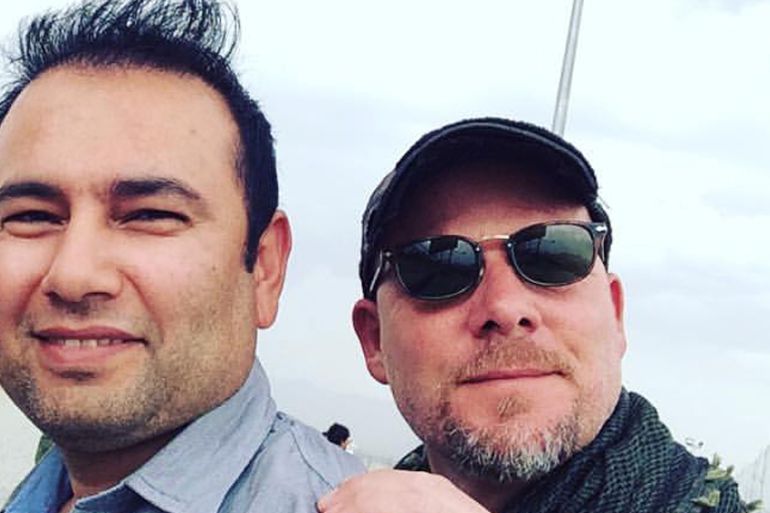NPR journalist killed in Afghanistan mourned
Families and friends mourn Zabihullah Tamanna and David Gilkey killed in a Taliban ambush in southern Helmand province.

Tributes have pourned in for Afghan journalist Zabihullah Tamanna and veteran US reporter David Gilkey killed in southern Afghanistan when their vehicle came under Taliban fire.
|
|
Gilkey, a veteran news photographer and video editor for National Public Radio (NPR) and Tamanna were travelling on Sunday with an Afghan army unit near Marjah in Helmand province when the convoy came under fire and their vehicle was struck, Isabel Lara, a spokeswoman for the US network, said in a statement.
Keep reading
list of 4 itemsNPR editor resigns after accusing US outlet of liberal bias
Lawmakers brawl as Georgian Parliament considers ‘foreign agent’ bill
Journalist loses foot after being badly wounded in Israeli attack in Gaza
Tamanna, 38, is survived by his wife and three children.
Two other NPR journalists travelling with Gilkey in a separate vehicle, reporter Tom Bowman and producer Monika Evstatieva, were unharmed.
Najib Sharifi, who is on the Afghan Journalists Safety Committee, told Al Jazeera that what has happened is an extremely heartbreaking situation for the media community in Afghanistan.
READ MORE: The Afghan war and the feeling of abandonment
“These were two great journalists. Zabihullah Tamanna has been involved in the media since 2001 and David Gilkey has been coming to Afghanistan since 2001.
“He [Gilkey] was a great friend of Afghanistan and has a lot of friends here, as he has once said – he has more friends in Afghanistan than he does in the US,” Sharifi said.
“I was earlier with the family of Zabihullah Tamanna and everybody was shocked. The children did not even known their dad had died.”
Gilkey’s colleagues responded with shock at the news of his sudden death, the first time in NPR’s 46-year history that it has lost a journalist on a reporting assignment.
“David has been covering war and conflict in Iraq and Afghanistan since 9/11. He was devoted to helping the public see these wars and the people caught up in them. He died pursuing that commitment,” said Michael Oreskes, NPR’s senior vice president of news and editorial director.
READ MORE: Civilians caught in crossfire of war against Taliban
“Even though much of the world’s attention has shifted away, let no one doubt that Afghanistan remains a dangerous place for journalists – local and foreign – working to cover that protracted conflict,” said Bob Dietz, the Asia programme coordinator at the Committee to Protect Journalists (CPJ).
“There are too many journalists who have given their lives to tell the Afghan story.”
Before the deaths of Gilkey and Tamanna, 24 journalists and one media worker had been killed in Afghanistan since the 2001 US-led invasion, the CPJ said.
Afghan President Ashraf Ghani condemned the attack and called it cowardly and “completely against all the principles and values of Islam and humanity, and against all international laws”.
In a statement, Ghani said that the Taliban did not distinguish between the military, civilians and journalists, and that they killed Gilkey and Tamanna as the two were reporting on the war. He offered condolences to their families.
IN PICTURES: Journalism’s human cost
Ghani went to Helmand later on Monday to assess the security situation in the poppy growing region, which gives the world most of its heroin and is controlled by the Taliban.
US Secretary of State John Kerry called the killings “a grim reminder of the danger that continues to face the Afghan people, the dedication of Afghan national defence and security forces to securing their country, and of the courage of intrepid journalists – and their interpreters – who are trying to convey that important story to the rest of the world.”